
Journal de Theorie des Nombres de Bordeaux
Scope & Guideline
Elevating Mathematical Discourse Globally
Introduction
Aims and Scopes
- Arithmetic Geometry:
Research in this area includes the study of rational points on algebraic varieties, Galois representations, and the geometric properties of schemes and their applications in number theory. - Diophantine Equations:
The journal features papers that explore solutions to polynomial equations and their properties, particularly in the context of rational numbers and p-adic fields. - Algebraic Number Theory:
This encompasses studies on number fields, class groups, L-functions, and their implications in various conjectures and theorems, including the Birch and Swinnerton-Dyer conjecture. - Modular Forms and L-Functions:
Contributions often discuss the relationship between modular forms, their symmetries, and L-functions, including special values and their arithmetic significance. - p-adic Analysis:
The journal publishes research on p-adic numbers, including their applications in number theory, algebraic geometry, and their role in various conjectures. - Representation Theory:
This includes the study of representations of Galois groups and their implications for number theory, particularly in relation to elliptic curves and modular forms. - Combinatorial Number Theory:
Research that applies combinatorial techniques to number theoretical problems, including the distribution of integers and their properties.
Trending and Emerging
- Geometric Approaches to Number Theory:
There is an increasing trend in utilizing geometric methods to address number-theoretic questions, particularly in the study of rational points on varieties and the interplay between geometry and arithmetic. - Non-Archimedean Methods:
Research employing non-archimedean analysis and p-adic techniques is becoming more prominent, showcasing a growing interest in the applications of these methods to number theory. - Computational Number Theory:
The rise in computational techniques and algorithms applied to number-theoretic problems is evident, reflecting the integration of computer science with traditional mathematics. - Connections between Number Theory and Algebraic Geometry:
Emerging themes increasingly focus on the connections between number theory and algebraic geometry, particularly in the context of moduli spaces, schemes, and their arithmetic properties. - Higher Dimensional Varieties:
There is a noticeable increase in research concerning higher-dimensional algebraic varieties and their implications for number theory, reflecting a trend towards exploring more complex structures.
Declining or Waning
- Elementary Number Theory:
While foundational results in elementary number theory remain significant, the journal has seen a decrease in publications that focus solely on these topics without deeper connections to algebraic or geometric aspects. - Classical Analytic Methods:
Papers relying heavily on classical analytic techniques for number theoretical problems have seen a decline, as newer approaches and computational methods gain traction. - Simple Combinatorial Techniques:
Research that employs straightforward combinatorial methods without integration into broader mathematical frameworks is less frequently represented, indicating a shift towards more complex and integrated approaches. - Historical Perspectives in Number Theory:
Papers that focus primarily on historical aspects of number theory or classical results without new insights or connections to current problems appear to be waning.
Similar Journals
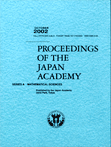
PROCEEDINGS OF THE JAPAN ACADEMY SERIES A-MATHEMATICAL SCIENCES
Connecting Ideas, Inspiring Discoveries in Mathematics.PROCEEDINGS OF THE JAPAN ACADEMY SERIES A-MATHEMATICAL SCIENCES, published by the JAPAN ACADEMY, serves as a premier platform for disseminating original research in the field of mathematical sciences. Based in Japan, this journal has been a vital contributor to the global mathematical community since its inception, with continuous publication from 1996 to 2024. While it currently holds a Q3 ranking in the miscellaneous mathematics category according to the 2023 category quartiles, it provides an invaluable repository of knowledge that facilitates advancements in various mathematical disciplines. Although it is not an open-access journal, it remains widely regarded for its rigorous peer-review process, ensuring that high-quality research is presented to its audience. The journal is essential for researchers, professionals, and students eager to stay informed about novel developments and trends in mathematics. With an ISSN of 0386-2194, it aspires to foster collaboration and innovation within the mathematical sciences.
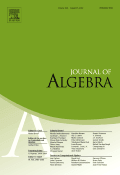
JOURNAL OF ALGEBRA
Driving Algebraic Discovery for Tomorrow's ScholarsThe JOURNAL OF ALGEBRA, published by Academic Press Inc. Elsevier Science, is a premier scholarly outlet dedicated to the field of algebra and number theory. With its impressive Q1 ranking in the 2023 category of Algebra and Number Theory and a solid Scopus rank of #46 out of 119, it stands as a crucial resource for researchers and professionals seeking to deepen their understanding of advanced algebraic concepts. Operating since 1964 and continuing through 2025, the journal boasts a rich history of publishing influential research that drives the discipline forward. While the journal does not currently offer open access options, it remains committed to providing high-quality peer-reviewed content to the academic community. Its comprehensive archive and cutting-edge research articles serve as essential tools for students, researchers, and practitioners aiming to stay at the forefront of algebraic studies.

Documenta Mathematica
Connecting Mathematicians with Cutting-Edge ResearchDocumenta Mathematica is a premier academic journal published by the European Mathematical Society (EMS), making significant contributions to the field of mathematics since its inception. With an Open Access model established in 1996, the journal ensures that scholarly works are freely available to a global audience, promoting widespread dissemination of mathematical research. Based in Germany, it serves as a vital platform for mathematicians, covering a wide array of topics within the discipline, evidenced by its impressive Q1 ranking in the miscellaneous category of mathematics as of 2023. Featuring rigorous peer-reviewed articles that span the latest trends and breakthroughs in the discipline, Documenta Mathematica also retains a commendable position among its peers with a Scopus rank of 163 out of 399, placing it in the 59th percentile for general mathematics. Researchers, professionals, and students alike will benefit from the robust scholarly content and the journal's commitment to advancing mathematical knowledge.
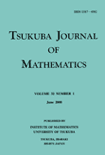
Tsukuba Journal of Mathematics
Cultivating a Community of Mathematical ExcellenceTsukuba Journal of Mathematics is a distinguished publication dedicated to advancing the field of mathematics through the dissemination of innovative research and comprehensive studies. Published by the University of Tsukuba, Department of Mathematics, this journal serves as a vital platform for mathematicians, researchers, and students to engage with cutting-edge mathematical theories and methodologies. Although currently not available as an open-access journal, it maintains a strong academic presence, contributing significantly to the global mathematical landscape. The journal invites submissions across various branches of mathematics, aiming to foster scholarly communication and collaboration. The ISSN 0387-4982 and the E-ISSN 2423-821X further establish its credibility and accessibility among the academic community, supporting its critical objective of facilitating high-quality research output. Situated in Tsukuba, Japan, a hub for scientific research and development, the Tsukuba Journal of Mathematics is committed to bridging gaps in mathematical knowledge and encouraging exploration of novel ideas.
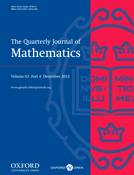
QUARTERLY JOURNAL OF MATHEMATICS
Championing Excellence in Mathematical ScholarshipQuarterly Journal of Mathematics, published by Oxford University Press, stands as a pivotal resource for the mathematical community, focusing on a broad spectrum of topics in the field of mathematics. With its esteemed history dating back to 1930, this journal continues to foster innovative research and discussions, providing a platform for scholars to share their findings and insights. Although the journal currently holds a Q3 classification in mathematics (miscellaneous) and is ranked #207 among general mathematics publications in the Scopus database, its commitment to quality and rigorous peer review ensures that it remains relevant and insightful. Researchers, professionals, and students alike will find the Quarterly Journal of Mathematics an invaluable tool for advancing knowledge and understanding in various mathematical disciplines, making it an essential addition to any academic library.

Analele Stiintifice ale Universitatii Ovidius Constanta-Seria Matematica
Advancing Mathematical Frontiers with Open Access InsightAnalele Stiintifice ale Universitatii Ovidius Constanta-Seria Matematica is a prominent open-access journal established by OVIDIUS UNIV PRESS in Romania, dedicated to advancing the fields of mathematics, specifically in Analysis and Applied Mathematics. Since its inception, the journal has emphasized the dissemination of high-quality research, making it accessible to a global audience. With an ISSN of 1224-1784 and E-ISSN 1844-0835, it has positioned itself within the academic community, achieving a respectable Q3 ranking in both analysis and applied mathematics in 2023, reflecting its commitment to rigorous scholarship. The journal spans a considerable publication window from 2009 to 2024, catering to the ongoing developments in mathematical sciences and their applications. Researchers, professionals, and students alike will find valuable insights and contributions that enrich their understanding and foster collaboration within the mathematical community. The journal's headquarters is based at the Faculty of Mathematics & Computer Science, Bulevardul Mamaia 124, Constanta, Romania.

RENDICONTI DEL SEMINARIO MATEMATICO DELLA UNIVERSITA DI PADOVA
Advancing mathematical knowledge for a global audience.RENDICONTI DEL SEMINARIO MATEMATICO DELLA UNIVERSITA DI PADOVA, published by the European Mathematical Society, stands as a notable open-access journal with a rich history in disseminating research across various domains of mathematics. With an ISSN of 0041-8994 and E-ISSN 2240-2926, this journal has embraced open access since 2023, significantly enhancing its visibility and accessibility to a global audience. Situated in Germany, its publishing house is based at Technical University Berlin, which emphasizes its academic roots and dedication to fostering mathematical research. The journal features a quartile ranking of Q3 across multiple categories including Algebra and Number Theory, Analysis, Geometry and Topology, and Mathematical Physics as of 2023, indicating a vibrant contribution to the field, despite its challenge in specific rankings. Researchers, professionals, and students alike will find in this journal a platform for innovative ideas and significant findings that are crucial to the evolution of modern mathematics.
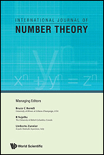
International Journal of Number Theory
Fostering Innovative Ideas in Mathematical ResearchInternational Journal of Number Theory is a prestigious scholarly publication dedicated to advancing the field of mathematical research, particularly in algebra and number theory. Published by WORLD SCIENTIFIC PUBL CO PTE LTD and situated in Singapore, this journal boasts an impressive reputation, holding a Q2 quartile ranking in its category for 2023. With a commitment to disseminating peer-reviewed research, the journal features works that explore both foundational and contemporary issues related to number theory, making it an essential resource for mathematicians, researchers, and students alike. Spanning from 2008 to 2024, the journal embraces a wide range of topics within the discipline, promoting innovative ideas and fostering academic discourse. Although it does not currently offer open access options, its rigorous selection process ensures that published articles maintain high standards of quality and impact, contributing significantly to the global mathematics community.
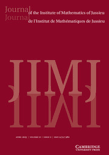
Journal of the Institute of Mathematics of Jussieu
Uniting Global Minds in the Pursuit of Mathematical ExcellenceJournal of the Institute of Mathematics of Jussieu, published by Cambridge University Press, is a leading academic journal that has established itself as a vital resource in the field of mathematics. With an impressive impact factor and a ranking in the top quartile (Q1) of miscellaneous mathematics, the journal serves as a platform for high-quality research from both established scholars and emerging researchers. Spanning from 2002 to 2024, the journal aims to foster collaboration and innovation in the mathematical community by publishing original research articles, reviews, and critical discussions on a wide range of mathematical topics. Although the journal does not offer open access, it remains widely accessible through various academic institutions and libraries, ensuring that critical advancements in mathematics are shared with a global audience. Located in the United Kingdom at the prestigious Cambridge campus, the journal reflects the rigorous standards of its publisher and the rich academic tradition of its home institution.
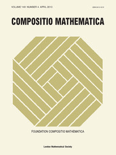
COMPOSITIO MATHEMATICA
Elevating Mathematical DiscourseCOMPOSITIO MATHEMATICA, published by Cambridge University Press, is a leading journal in the field of mathematics, with a specific focus on algebra and number theory. With an impressive impact factor and ranked in the Q1 quartile for its category, it holds a prominent position in the academic landscape, currently standing at Rank #26 out of 119 journals in its field, within the 78th percentile of its category, according to Scopus rankings. Since its inception in 1996, the journal has been dedicated to publishing high-quality research articles that contribute significantly to the advancement of mathematical knowledge and theory. While it does not offer open access, the journal ensures a rigorous peer-review process that upholds the highest academic standards. Researchers, professionals, and students alike are encouraged to engage with the rich, innovative content of COMPOSITIO MATHEMATICA, which continues to foster a vibrant scholarly community dedicated to exploration and discovery in mathematics.